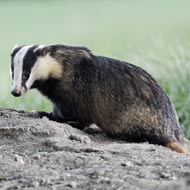Targeted badger cull to take place in Wales

The Welsh government continues to rule out a large scale badger cull, such as that being carried out in England.
Plans to introduce a targeted badger cull in Wales will go ahead, the government has confirmed as it published a new TB eradication programme.
From 1 October, areas of Wales will be identified as Low, Intermediate and High TB areas, based on bovine TB incidence. The aim is to protect the Low TB areas and reduce the disease in Intermediate and High areas.
Chronic breakdown herds will be given individual action plans and disease control measures that are specifically designed to clear infection in cattle.
In these herds, where there is evidence of infection in the badger population, the government says will consider ‘a range of options’ to reduce the risk of disease spreading, including cage trapping, testing and, were necessary, humanely killing infected badgers. The Welsh government continues to rule out a large scale badger cull, such as that being carried out in England.
Enhanced controls will be applied in all areas, including post-movement testing in the Low TB areas, beginning on 1 October this year. This measure will also be introduced in the Intermediate TB areas next year to prevent the disease spreading from neighbouring High TB areas.
Speaking at the Senedd, Welsh cabinet secretary Lesley Griffiths said “real progress” had been made in eradicating TB in Wales. The number of new incidents has fallen by over 40 per cent since their peak in 2009 and 95 per cent of herds are now TB free.
The strengthened TB eradication programme has been introduced following a consultation launched at the end of last year.
Ms Griffiths added: “I have listened to the industries responses to our consultation and have fed what was appropriate and reasonable into the Programme.This should not be seen as exclusively a Government plan; it has been developed through consultation with industry, and will be reviewed over time.
“I now call on the farming industry and veterinary profession to play a full part. Together we can achieve our goal of a TB free Wales.”



 The BSAVA has opened submissions for the BSAVA Clinical Research Abstracts 2026.
The BSAVA has opened submissions for the BSAVA Clinical Research Abstracts 2026.